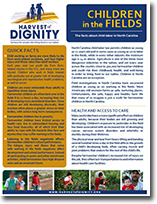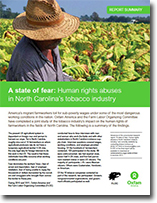60 Minutes misses the rest of the story
 Tuesday, May 31, 2011 at 1:28PM by
Tuesday, May 31, 2011 at 1:28PM by  Chris Liu-Beers
Chris Liu-Beers On Sunday, May 22, CBS’ 60 Minutes featured a report on child labor in agriculture in the U.S. The report primarily focused on the economic necessity of young children working in the fields to both the grower and the farmworker. Currently, children as young as 12-years-old are allowed to work an unlimited number of hours in the fields outside of school hours. In almost every other industry you must be at least 14 years of age and the hours permitted to work are limited. The 60 Minutes segment appears to justify the existence of child labor and how and why it plays an “inevitable” role within the complexities of the agriculture industry. However, there is something terribly askew in this business model if producing fruits and vegetables forces growers and farmworkers to employ children, so that both can financially stay afloat as well as feed the nation.
AFOP’s Children in the Fields Campaign Program Director Norma Flores López was also featured in the segment. Back in August, Flores López, who is a former migrant farmworker, sat for an hour long interview, sharing the barriers and dangers farmworker children face as a result of the unfair agriculture exemption in the U.S. child labor law. While the report did shine a light on the agriculture exemption, important information shared by Flores López describing why children should not be exempted from the protections established in the child labor law that governs other industries was missing.
Children who work in the fields are exposed to many dangers including pesticide exposure, which has been scientifically linked to delays in learning rates, reduced physical coordination, cancers, and behavioral problems to name only a few. Farmworker children are also exposed to heat-related illnesses and are subjected to injury and even fatality from operating heavy and dangerous machinery and equipment.
Farmworker children in North Carolina have reported experiencing vomiting, dizziness, nausea, rashes, sunburn, and heat sickness while working in the fields. We need to stop and ask ourselves, “Would I allow my 12-year-old child to work 10 hours a day, 6 days a week in the tobacco or strawberry fields knowing these risks?”
Take a stance to end child labor in North Carolina’s fields! Visit www.harvestofdignity.org for simple ways you can take action.
Emily Drakage
Children in the Fields Campaign
Association of Farmworker Opportunity Programs
 Chris Liu-Beers
Chris Liu-Beers
Here is extra video of Norma Flores Lopez that is online but did not appear in the televised report:
 children in the fields,
children in the fields,  labor conditions in
labor conditions in  Video
Video 













